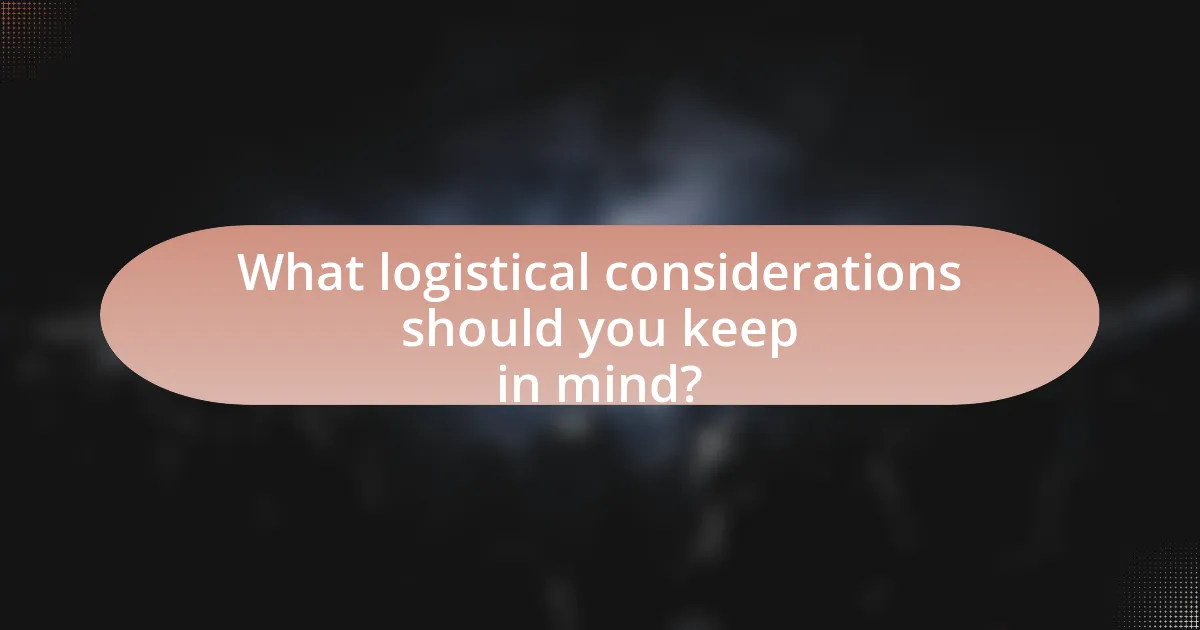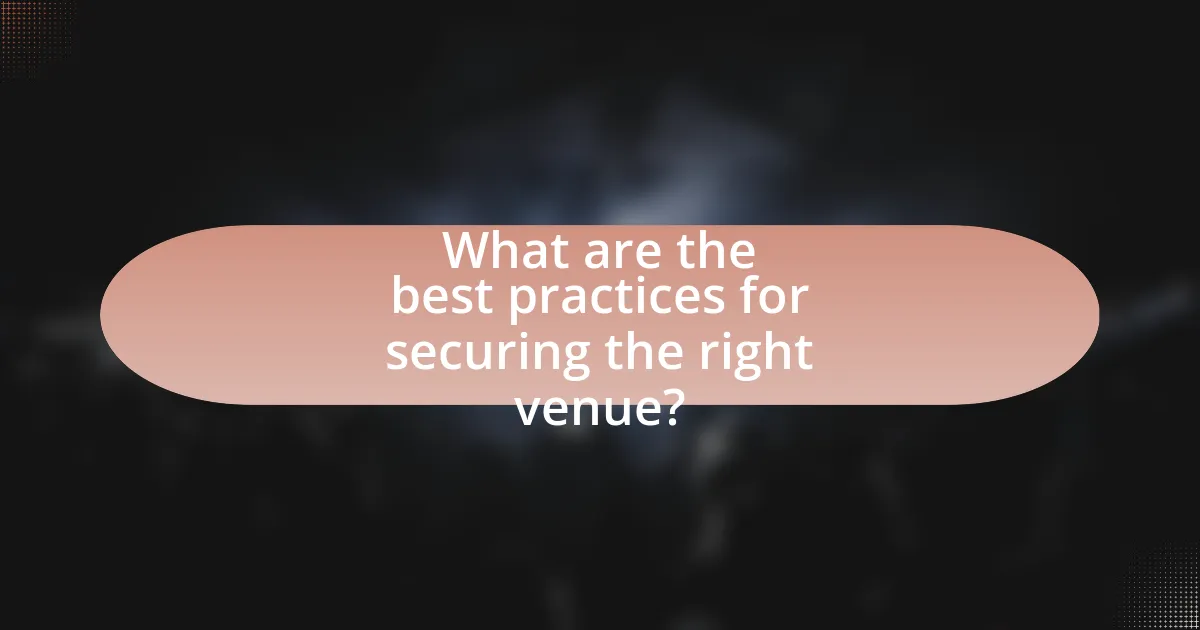The article focuses on the essential factors to consider when selecting a venue for an indie band, emphasizing location, capacity, acoustics, and available amenities. It discusses how venue size affects performance dynamics and audience engagement, highlighting the ideal capacity range for indie performances. The significance of a venue’s reputation, logistical considerations, and financial implications are also examined, along with best practices for securing the right venue and effective communication with venue managers. Additionally, the article outlines strategies for negotiating favorable terms and preparing for potential challenges, ensuring a successful performance experience.

What factors should you consider when choosing a venue for your indie band?
When choosing a venue for your indie band, consider factors such as location, capacity, acoustics, and amenities. The location should be accessible to your target audience, ideally in a vibrant area that attracts foot traffic. Capacity is crucial; select a venue that can comfortably accommodate your expected audience size to create an engaging atmosphere. Acoustics significantly impact sound quality, so evaluate how the venue’s design affects audio performance. Additionally, amenities like stage size, lighting, and sound equipment can enhance the overall experience for both the band and the audience. These considerations ensure a successful performance and a positive experience for attendees.
How does the size of the venue impact your band’s performance?
The size of the venue significantly impacts a band’s performance by influencing audience engagement and sound quality. Larger venues often create a more dispersed audience, which can diminish the intimate connection between the band and the listeners, while smaller venues facilitate closer interactions, enhancing the overall experience. Additionally, sound dynamics vary with venue size; smaller spaces can amplify sound clarity and allow for better acoustic control, whereas larger venues may require more advanced sound systems to maintain audio quality. Studies have shown that audience satisfaction is higher in smaller venues due to the personal atmosphere they provide, which can lead to increased energy and enthusiasm during performances.
What is the ideal capacity for an indie band performance?
The ideal capacity for an indie band performance typically ranges from 100 to 500 attendees. This range allows for an intimate atmosphere that fosters a strong connection between the band and the audience, which is essential for indie music’s appeal. Venues within this capacity often provide better acoustics and a more engaging experience, as evidenced by numerous successful indie acts that thrive in smaller settings, such as local clubs and small theaters.
How does audience size affect the atmosphere of the show?
Audience size significantly influences the atmosphere of a show by affecting the energy and engagement levels within the venue. A larger audience typically creates a more vibrant and dynamic atmosphere, as collective enthusiasm can amplify the performance experience for both the performers and the attendees. Conversely, a smaller audience may lead to a more intimate setting, allowing for personal interactions and a different kind of connection between the band and the audience. Research indicates that audience size can impact perceived energy levels, with studies showing that larger crowds often result in heightened emotional responses and increased enjoyment of the performance.
What role does location play in selecting a venue?
Location is crucial in selecting a venue as it directly influences accessibility, audience turnout, and the overall atmosphere of the event. A venue situated in a central or popular area tends to attract more attendees due to convenience and visibility, while a remote location may deter potential guests. Additionally, the surrounding environment can enhance the experience; for instance, a venue near vibrant nightlife can create a lively atmosphere that appeals to indie band fans. Studies indicate that venues located in high-traffic areas see up to 30% higher attendance rates compared to those in less accessible locations, underscoring the importance of location in venue selection.
How can proximity to your fan base influence attendance?
Proximity to a fan base significantly influences attendance by making it easier for fans to access events. When venues are located near the majority of a band’s supporters, the likelihood of attendance increases due to reduced travel time and costs. For instance, a study by the National Endowment for the Arts found that local events attract larger crowds, with 70% of attendees coming from within a 20-mile radius. This demonstrates that geographical closeness directly correlates with higher turnout rates, as fans are more inclined to attend events that are conveniently located.
What are the advantages of choosing a venue in a popular area?
Choosing a venue in a popular area increases visibility and accessibility for an indie band. High foot traffic in these locations often leads to a larger audience, enhancing the potential for ticket sales and merchandise revenue. Additionally, venues in popular areas typically benefit from established reputations, attracting patrons who are more likely to attend events. According to a study by the National Endowment for the Arts, events held in well-frequented areas see a 30% increase in attendance compared to those in less popular locations. This data underscores the financial and promotional advantages of selecting a venue in a vibrant, well-trafficked area.
Why is the venue’s reputation important for indie bands?
The venue’s reputation is crucial for indie bands because it directly influences audience turnout and the band’s credibility. A well-regarded venue attracts larger crowds, which can lead to increased exposure and potential fan engagement. For instance, venues known for hosting successful indie acts often have established audiences that trust the venue’s programming, thereby enhancing the likelihood of a successful performance. Additionally, a positive reputation can facilitate networking opportunities with industry professionals, further benefiting the band’s career trajectory.
How can a venue’s past events affect your band’s image?
A venue’s past events can significantly influence your band’s image by shaping audience perceptions and expectations. For instance, if a venue is known for hosting high-profile acts or successful events, performing there can enhance your band’s credibility and attract a larger audience. Conversely, if the venue has a history of poorly attended shows or negative incidents, it may detract from your band’s reputation and discourage potential fans from attending. Research indicates that venues with a strong positive history can lead to increased ticket sales and a more favorable public image for performing artists, as seen in case studies of venues like The Troubadour in Los Angeles, which has a legacy of launching successful careers.
What should you research about a venue’s history before booking?
Before booking a venue, you should research its historical reputation, past events, and any notable incidents. Understanding the venue’s historical reputation helps gauge its reliability and suitability for your indie band’s image. For instance, venues with a history of hosting successful events may attract larger audiences, while those with negative incidents could deter potential attendees. Additionally, researching past events can provide insight into the venue’s capacity, acoustics, and overall atmosphere, which are crucial for a successful performance. Notable incidents, such as safety issues or management changes, can also impact your decision, as they may affect the venue’s current operations and reputation.

What logistical considerations should you keep in mind?
When choosing a venue for your indie band, key logistical considerations include capacity, location, accessibility, and equipment availability. The venue’s capacity must align with your expected audience size to ensure a comfortable experience and maximize ticket sales. Location is crucial; it should be easily accessible for both the audience and the band, ideally situated near public transportation or parking facilities. Accessibility for individuals with disabilities is also essential to comply with regulations and promote inclusivity. Additionally, the availability of necessary equipment, such as sound systems and lighting, directly impacts the quality of the performance. These factors collectively influence the overall success of the event and should be thoroughly evaluated before making a decision.
How do sound and lighting capabilities affect your performance?
Sound and lighting capabilities significantly impact performance quality by enhancing audience engagement and overall experience. High-quality sound systems ensure that music is delivered clearly, allowing the audience to appreciate the nuances of the performance, while effective lighting creates an immersive atmosphere that complements the music. Research indicates that venues with superior sound and lighting can increase audience satisfaction by up to 30%, leading to higher chances of repeat attendance and positive word-of-mouth promotion. Therefore, selecting a venue with robust sound and lighting capabilities is crucial for maximizing performance effectiveness and audience enjoyment.
What technical requirements should you discuss with the venue?
When discussing technical requirements with the venue, you should address sound equipment, lighting systems, stage dimensions, and power supply specifications. Sound equipment includes microphones, speakers, and mixing consoles, which are essential for optimal audio quality during performances. Lighting systems should accommodate various setups and effects to enhance the visual experience. Stage dimensions must be suitable for your band’s size and performance style, ensuring adequate space for movement and equipment. Additionally, confirming the power supply specifications is crucial to support all technical equipment without risk of failure. These elements are vital for a successful performance and should be clearly outlined in discussions with the venue.
How can the venue’s acoustics impact your band’s sound?
The venue’s acoustics significantly impact your band’s sound by influencing how sound waves interact within the space. Poor acoustics can lead to muddled sound, where frequencies overlap and create a lack of clarity, making it difficult for the audience to appreciate the music. Conversely, well-designed acoustics enhance sound quality, allowing for a balanced mix of instruments and vocals, which is crucial for live performances. Research indicates that venues with optimal acoustic properties can improve audience engagement and overall performance quality, as seen in studies conducted by the Acoustical Society of America, which highlight the importance of sound reflection and absorption in enhancing musical experiences.
What are the financial implications of choosing a venue?
Choosing a venue has significant financial implications, including rental costs, potential revenue from ticket sales, and additional expenses such as insurance and staffing. The rental cost varies widely based on location, capacity, and amenities; for instance, a venue in a major city may charge upwards of $5,000 for a single night, while smaller venues in less populated areas may charge $1,000 or less. Revenue from ticket sales is directly influenced by the venue’s capacity and ticket pricing; a venue that holds 500 people charging $20 per ticket can generate $10,000 in gross revenue, which must be balanced against the venue’s rental fee and other costs. Additional expenses, such as insurance, which can range from $200 to $1,000 depending on the venue and event type, and staffing costs, which may include security and technical support, further impact the overall financial outcome. Therefore, careful consideration of these factors is essential for maximizing profitability when selecting a venue for an indie band.
How do rental fees vary between different types of venues?
Rental fees vary significantly between different types of venues, influenced by factors such as location, capacity, and amenities. For instance, a large concert hall may charge between $5,000 to $20,000 for a rental, while smaller local bars or clubs typically range from $500 to $3,000. Additionally, outdoor venues can have variable costs depending on the season and required permits, often ranging from $1,000 to $10,000. These differences reflect the operational costs, demand, and the unique offerings of each venue type, making it essential for indie bands to assess their budget and venue requirements carefully.
What additional costs should you anticipate when booking a venue?
When booking a venue, you should anticipate additional costs such as security fees, cleaning fees, equipment rental, and insurance. Security fees are often required to ensure the safety of attendees and can vary based on the venue size and event type. Cleaning fees may be charged to cover post-event cleanup, especially if food or drink is served. Equipment rental costs can arise if the venue does not provide necessary sound or lighting equipment, which is crucial for an indie band performance. Additionally, insurance may be required to protect against potential liabilities, and this cost can vary based on the venue’s policies and the nature of the event.
How does the availability of amenities influence your choice?
The availability of amenities significantly influences the choice of venue for an indie band by enhancing the overall experience for both performers and attendees. Venues equipped with essential amenities such as sound systems, lighting, and backstage facilities facilitate a smoother performance and contribute to the quality of the show. For instance, a study by the National Endowment for the Arts found that venues with better amenities attract larger audiences, which can lead to increased ticket sales and greater exposure for the band. Additionally, amenities like food and beverage options, restrooms, and parking can improve attendee satisfaction, encouraging repeat visits and positive word-of-mouth promotion. Thus, the presence of adequate amenities directly impacts the decision-making process when selecting a venue for performances.
What amenities should you look for in a venue for your band?
When selecting a venue for your band, you should prioritize amenities such as sound equipment, stage size, lighting, and backstage facilities. Sound equipment is crucial as it directly impacts audio quality; venues should provide high-quality PA systems and monitors. The stage size must accommodate your band comfortably, allowing for movement and performance dynamics. Adequate lighting enhances the visual experience, so venues should offer adjustable lighting systems. Backstage facilities, including dressing rooms and restrooms, are essential for band members’ comfort and preparation. These amenities collectively ensure a professional performance environment, which is vital for audience engagement and overall success.
How can backstage facilities enhance your performance experience?
Backstage facilities enhance your performance experience by providing essential support and comfort for artists before and after their shows. Access to amenities such as dressing rooms, restrooms, and catering allows performers to prepare adequately, reducing stress and improving focus. For instance, a study by the University of Southern California found that artists with access to quality backstage facilities reported higher satisfaction levels and better performance outcomes. Additionally, well-equipped spaces for rehearsals and sound checks contribute to a smoother production process, ultimately leading to a more polished performance.

What are the best practices for securing the right venue?
The best practices for securing the right venue include conducting thorough research, assessing the venue’s capacity and layout, and ensuring it aligns with the band’s target audience. Researching venues involves checking online reviews, visiting in person, and comparing similar venues to gauge suitability. Assessing capacity ensures that the venue can accommodate the expected audience, which is crucial for both comfort and financial viability. Additionally, the layout should facilitate good acoustics and visibility for the performance. According to a survey by Eventbrite, 70% of event organizers prioritize venue suitability based on audience experience, highlighting the importance of these practices in securing the right venue.
How can you effectively communicate with venue managers?
To effectively communicate with venue managers, establish clear and concise communication from the outset. This involves preparing specific questions regarding availability, capacity, and technical requirements, which demonstrates professionalism and respect for their time. Additionally, providing detailed information about your indie band, including genre, audience size, and performance history, helps venue managers assess compatibility with their venue. Researching the venue’s past events and understanding their target audience can further tailor your approach, making your communication more relevant and effective.
What key questions should you ask during initial discussions?
During initial discussions about choosing the right venue for your indie band, key questions to ask include: What is the venue’s capacity and how does it align with your expected audience size? Understanding the venue’s capacity ensures that it can accommodate your audience comfortably, which is crucial for both safety and atmosphere. Additionally, inquire about the venue’s availability on your desired dates, as scheduling conflicts can hinder your plans. It’s also important to ask about the venue’s sound system and technical support, as quality audio equipment is essential for a successful performance. Furthermore, discuss the venue’s policies on ticket sales and revenue sharing, as these financial aspects directly impact your band’s earnings. Lastly, ask about the venue’s marketing support and promotional efforts, since effective marketing can significantly enhance attendance. These questions provide a comprehensive understanding of the venue’s suitability for your band’s needs.
How can building a relationship with venue staff benefit your band?
Building a relationship with venue staff can significantly benefit your band by facilitating better communication and support during performances. When a band establishes rapport with the staff, it often leads to more favorable treatment, such as priority scheduling, access to better equipment, and assistance with logistics. For instance, venues are more likely to promote bands they have a good relationship with, increasing the band’s visibility and audience reach. Additionally, positive interactions can result in valuable feedback from staff, helping the band improve their performances and overall presentation. This mutual respect can also lead to repeat bookings, as venues prefer to work with bands that are easy to collaborate with and contribute to a positive atmosphere.
What strategies can help you negotiate better terms?
To negotiate better terms, indie bands should employ strategies such as thorough research, clear communication, and leveraging competition. Conducting research on venue pricing and terms allows bands to understand industry standards, which strengthens their negotiating position. Clear communication of the band’s needs and expectations fosters a collaborative atmosphere, making venue owners more likely to accommodate requests. Additionally, showcasing interest from multiple venues can create a competitive environment, prompting venue owners to offer more favorable terms to secure the band. These strategies are supported by industry practices where informed and assertive negotiation often leads to improved contracts and conditions for artists.
How can you leverage your band’s following in negotiations?
You can leverage your band’s following in negotiations by presenting your audience size and engagement metrics as a valuable asset. For instance, if your band has a social media following of 10,000 engaged fans, you can use this data to negotiate better terms with venues, such as higher guarantees or a larger share of ticket sales. Venues are more likely to partner with bands that can draw a crowd, as demonstrated by a study from the National Independent Venue Association, which found that 70% of venues prioritize artists with a proven ability to attract audiences. By showcasing your following, you enhance your bargaining power and increase the likelihood of favorable negotiation outcomes.
What are common negotiation tactics used by indie bands?
Common negotiation tactics used by indie bands include leveraging their unique brand identity, showcasing audience engagement metrics, and emphasizing their potential for drawing crowds. Indie bands often highlight their distinct sound and artistic vision to negotiate better terms, as this can attract venues looking for diverse acts. Additionally, presenting data on social media following and past performance attendance can strengthen their position, demonstrating their ability to bring in an audience. These tactics are effective because they provide tangible evidence of the band’s value, making it easier to negotiate favorable deals with venue owners.
What tips can help ensure a successful venue experience?
To ensure a successful venue experience, indie bands should prioritize clear communication with venue management regarding technical requirements and performance expectations. This includes discussing sound equipment, stage setup, and any specific needs for the performance. Research indicates that effective communication can lead to better logistical arrangements, enhancing the overall experience for both the band and the audience. Additionally, arriving early for sound checks allows for adjustments and fosters a collaborative atmosphere with venue staff, which is crucial for a smooth performance.
How can you prepare for unexpected challenges at the venue?
To prepare for unexpected challenges at the venue, conduct a thorough risk assessment and develop contingency plans. Identifying potential issues such as equipment failure, power outages, or adverse weather conditions allows for proactive solutions. For instance, having backup equipment and a reliable power source can mitigate the impact of technical difficulties. Additionally, establishing clear communication channels with venue staff ensures quick responses to any arising problems. According to a study by the Event Safety Alliance, 70% of event organizers who implemented risk management strategies reported smoother operations during unforeseen circumstances.
What should you do post-performance to maintain a good relationship with the venue?
To maintain a good relationship with the venue post-performance, express gratitude to the venue staff and management. This can be done through a thank-you note or a personal message, acknowledging their support and efforts in hosting the event. Additionally, providing feedback about the experience can foster open communication and show appreciation for their services. According to industry practices, venues value positive relationships with performers, as it can lead to future collaborations and recommendations.


